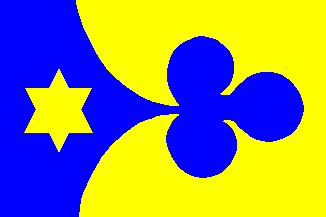
Last modified: 2018-12-15 by rob raeside
Keywords: waadkant |
Links: FOTW homepage |
search |
disclaimer and copyright |
write us |
mirrors
 from Shipmate's Flagchart
See also:
from Shipmate's Flagchart
See also:
![[De Waadkant's Coat of Arms]](../images/n/nl-pb)wk.jpg) image from this site,
reported by Gerard van der Vaart, 11 February 2001
image from this site,
reported by Gerard van der Vaart, 11 February 2001
The blue chief symbolizes the Wadden-area. The clover refers to the
penetrating sea being repelled by land. Clover was also one of the elements
of the arms of former polderboard 'Tusken Waed en Ie'. In the chief
there is also a yellow six-pointed star, which may be interpreted as the
position of the Polderboard, and also as reference to the seat of the board:
the village of Stiens (in Leeuwarderadeel).
The two rings with crosses are a compromise of the comparable elements
from the arms of both former polderboards.
Jarig Bakker, 3 May 2003
![[Tusken Waed en Ie Polderboard]](../images/n/nl~pb-tw.gif) by Jarig Bakker, 20 May 2004
by Jarig Bakker, 20 May 2004
Official name: Wetterskip Tusken Waed en Ie; seat Stiens, Fryslân
province.
Flag adopted ?; design: ?
Flagdescription: Three horizontal stripes of blue, yellow, and blue,
proportioned 1:3:1; the bottom stripe wavy; a red canton of 2/5 flagheight,
charged with a white mill.
Source: DerkWillem Visser's Gemeentevlaggen en wapens Koninkrijk der
Nederlanden, 2001.
The mill has been taken from the polderboard arms and is supposed to
represent the potato-growth in this region in the North of Fryslân.
The board was abolished in 1997 and became part of the new polderboard
De Waadkant.
Jarig Bakker, 20 May 2004